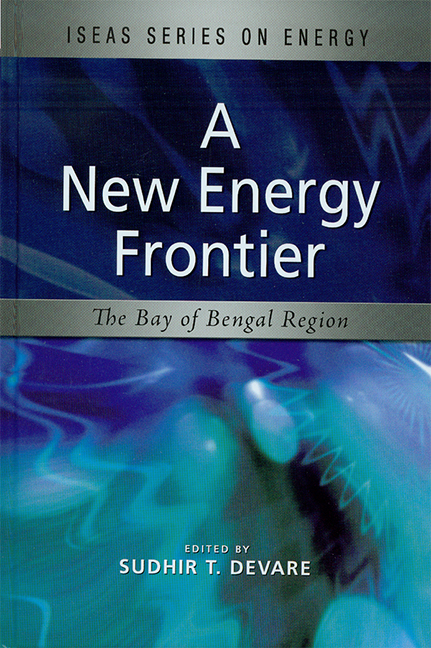Book contents
- Frontmatter
- Content
- Foreword
- Message from the Director
- Preface
- The Contributors
- 1 An Overview of the Energy Scene in the Bay of Bengal Region
- 2 Current and Expected Energy Production and Consumption within the Bay of Bengal Region: A Synopsis
- 3 Gas Potential at the Bay of Bengal and Implications for India's Energy Security
- 4 Macroeconomic Challenges for the Growth of the Energy Sector in Bangladesh in the Context of Regional Integration
- 5 Energy in the Bay of Bengal Region: Myanmar's Perspective
- 6 Marine-related Energy Resources in the Eastern Indian Ocean: Indonesian Perspective
- 7 Energy Trading and Singapore's Role as a Hub
- 8 Bay of Bengal: Awakening of a Potential Giant Area
- 9 Energy Transportation Security in the Bay of Bengal
- 10 Ethical Business Practice or Camouflage? Energy and Mining Companies and Corporate Social Responsibility
- 11 Sustainable and Renewable Energy: Scenarios for the Future
- Index
7 - Energy Trading and Singapore's Role as a Hub
Published online by Cambridge University Press: 21 October 2015
- Frontmatter
- Content
- Foreword
- Message from the Director
- Preface
- The Contributors
- 1 An Overview of the Energy Scene in the Bay of Bengal Region
- 2 Current and Expected Energy Production and Consumption within the Bay of Bengal Region: A Synopsis
- 3 Gas Potential at the Bay of Bengal and Implications for India's Energy Security
- 4 Macroeconomic Challenges for the Growth of the Energy Sector in Bangladesh in the Context of Regional Integration
- 5 Energy in the Bay of Bengal Region: Myanmar's Perspective
- 6 Marine-related Energy Resources in the Eastern Indian Ocean: Indonesian Perspective
- 7 Energy Trading and Singapore's Role as a Hub
- 8 Bay of Bengal: Awakening of a Potential Giant Area
- 9 Energy Transportation Security in the Bay of Bengal
- 10 Ethical Business Practice or Camouflage? Energy and Mining Companies and Corporate Social Responsibility
- 11 Sustainable and Renewable Energy: Scenarios for the Future
- Index
Summary
INTRODUCTION
This chapter examines energy trading and Singapore's role as a hub. Singapore is the third largest refining centre in the world after Houston and Rotterdam. The refineries serve as a swing refinery whereby it will supplement those countries with insufficient refining capacity as well as serve countries whose product shortfalls arise out of refinery outage or extremity of weather. Due to its strategic location, Singapore has served well as a hub where large cargoes of oil are received from Europe and the Middle East and the products are stored and reshipped in smaller lots to suit the requirements and port facilities of the surrounding countries. In view of the above, Singapore also emerged as a major oil trading centre together with New York and London. All the major oil companies are present here and so are most of the Middle East oil producers and refiners, the Chinese, Japanese and the South Korean refiners and oil trading companies. Besides refining 1,300,000 barrels per day of oil, Singapore imports 939,000 barrels per day and exports 1,145,000 barrels per day of finished product.
Refining Capacity (Appendix 7.1)
The Singapore refining capacity remains at 1.3 million bbl per steam day. Except for some debottlenecking at ExxonMobil, the latest addition to the refining unit, a condensate splitter, was added by Shell in 2003. All the refineries in Singapore are sophisticated, that is, on the downstream side there are many upgrading units such as reformers, hydrocrackers, visbreakers, fluid catalytic crackers, residue catalytic crackers, etc. There are many hydrodesulphurizers which can reduce the sulphur content of all the products to meet the current environmental friendly specifications. The range of products produced are liquefied petroleum gas, used for cooking and transportation, naphtha for upgrading to gasoline as well as feedstock for the petrochemical industries, jet fuel for aviation use, kerosene for heating, cooking and lighting, diesel for industries and transportation, fuel oil for ship's use and for power generation, bitumen for making roads, sulphur for industrial use, propylene for petrochemical use, and last but not least, lube oil base stock for making lubricating oil for automotive, ship and industrial use.
- Type
- Chapter
- Information
- A New Energy FrontierThe Bay of Bengal Region, pp. 128 - 138Publisher: ISEAS–Yusof Ishak InstitutePrint publication year: 2008



